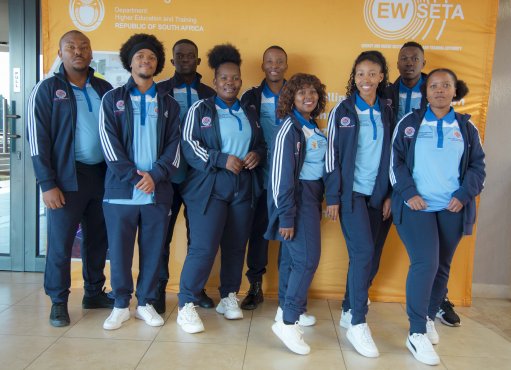
(From left to right) – Electrical Engineering students from South West Gauteng TVET College who will travel to China - Kagiso Lekoma, Mihlali Cwayi, Norman Mantsho Mashabela, Nthabiseng Sekhula, Believe Lufano Ramano, Lerato Jacqueline Masinga, Tshiseletso Matlhare, Phumlani Mabuza and Nobulali Annah Manana.
The role of technical vocational education and training (TVET) colleges in South Africa’s just energy transition is expected to be bolstered by a partnership led by the Energy and Water Sector Education and Training Authority (EWSETA) and the Chinese Culture and International Education Exchange Centre (CCIEEC).
“This programme not only seeks to establish a comprehensive renewable energy education and industry system in the country’s TVET colleges but also to enhance the international standards of South African TVET colleges over the next five to ten years,” explains EWSETA CEO Mpho Mookapele.
At the launch function held on May 31, the programme partners bid farewell to 54 learners and six lecturers from TVET colleges who will travel to China for a year-long experiential learning programme.
The learners, who will be trained in the field of solar PV manufacturing, are from the Elangeni TVET College in KwaZulu-Natal, Vhembe TVET College in Limpopo, Ingwe College in the Eastern Cape, South West Gauteng and Westcol TVET colleges in Gauteng and the Northern Cape Rural TVET in the Northern Cape.
In April, the Seta Integrated High Impact Programme (SIHIP) was launched, outlining a series of initiatives to be undertaken by Setas to drive collaboration and cooperation among Setas, aimed at maximising the impact and effectiveness of Seta programmes towards national development goals.
The Just Energy Transition Learner and Lecturer Development Support Programme aligns to the aims of the SIHIP, with EWSETA partnering with the Construction Education and Training Authority and the Food and Beverage Manufacturing Seta on this programme, enabling the programme to be scaled up from an initial four TVET colleges to the participation of six TVET colleges.
EWSETA’s involvement with the CCIEEC is said to offer several benefits.
Through the provision of high-quality trainers, curriculum development, exchange programmes, research and involvement by Chinese companies, as well as funding streams, the partnership is expected to directly benefit the learners and lecturers involved, as well South Africa’s critical power supply issues and the country’s national imperatives of economic recovery and skills development.
From a long-term sustainability perspective, the development of renewable energy production lines within the TVET colleges, where manufacturing of solar panels, inverters and lithium batteries will be done locally, is anticipated to add additional revenue streams for the identified TVET colleges and global competitiveness for South Africa in a market dominated by China.
These production lines are slated to grow the country’s TVET college capacity, and further, by affording learners practical workplace opportunities, the quality of renewable-energy skills coming out of these TVET colleges is expected to benefit.
The programme will leverage Chinese experience and technology in education; enhance the quality of South African TVET education through international collaboration; integrate educational programmes with industry needs and provide students with practical skills and real-world experience.
From a skills development perspective, the programme will address critical skill shortages in renewable energy and other sectors, as well as prepare students and educators for emerging technologies and industries.